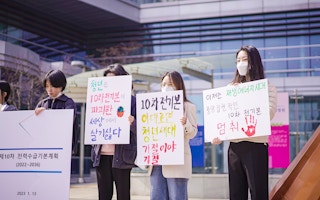A group of citizens and two renewable energy companies have sued the South Korean government for backsliding on commitments to boost its clean energy capacity.
To continue reading, subscribe to Eco‑Business.
There's something for everyone. We offer a range of subscription plans.
- Access our stories and receive our Insights Weekly newsletter with the free EB Member plan.
- Unlock unlimited access to our content and archive with EB Circle.
- Publish your content with EB Premium.
In the country’s revised national electricity plan, confirmed in January, the government reduced the 2030 target for renewable energy’s share of the power generation mix from 30.2 per cent to 21.6 per cent, a move campaigners say will make Korea’s climate commitments harder to achieve.
Korea, the world’s seventh largest emitter, committed to achieving net-zero emissions by 2050 in 2020 and plans to rely more on nuclear power to decarbonise the fossil fuels-heavy energy sector.
The plaintiffs filed for revocation of the electricity plan, which serves as the basis for how the administration invests in energy infrastructure, at the Seoul Administrative Court on Monday, 20 March. The plaintiffs have been backed by 24 non-governmental organisations, including Seoul-based climate group Solutions for our Climate.
“[The plan] goes against the global trend of achieving carbon neutrality and responding to the climate crisis” and violates the basic rights of future generations who have no say on the electricity plan, the plaintiffs said in a joint statement.
South Korea’s renewable energy industry is already lagging, says the group, pointing out that solar and wind only have 5 per cent share in the country’s energy mix, compared to a global average of 10 per cent.
The electricity plan also lowered the proportion of renewable energy generation required for larger power producers such as state-owned oil, gas, and coal companies, from 25 per cent to 15 per cent by 2026. This will squeeze renewable energy providers, particularly smaller firms, the group said.
Highly-industrialised Korea is more dependent on fossil fuels than most other wealthy countries, with more than a third of its electricity powered by coal. The electricity plan shows that the government will continue to rely on fossil fuels, with 28 coal-fired power plants to be replaced by fossil gas plants by 2036, the group noted.
“For us to respond to the climate crisis and pass on our legacy to future generations, the government must review the plan from square one and re-establish a plan that’s in line with its carbon neutrality goal,” said Sang-wan Shim, chairperson of renewables firm Gyeongnam Sunlight Power Generation Co-op and one of the plaintiffs.
The plaintiffs have also shared concerns that Korea’s trade ministry did not address concerns expressed about the plan by the environment ministry and experts in academia, industry, and civic organisations.
“Currently there is no procedural mechanism to ensure the independence, fairness, and transparency of the experts involved,” the plaintiffs said.
Similar transparency concerns have been raised about Korea’s carbon neutrality plan, as the first draft has yet to be made public. The carbon neutrality roadmap is expected to be based on the electricity plan. A public hearing over the plan is slated for 22 March.
Korea’s weakened renewables roadmap has raised questions about decarbonising the country’s corporations. For instance, a commitment made last September by Samsung, one of Korea’s largest companies, to use only clean energy by 2030 would be difficult to meet because of a short supply in the home market.










